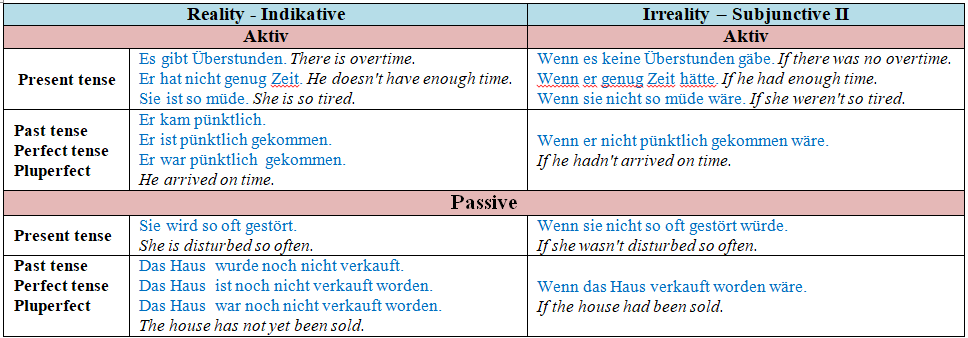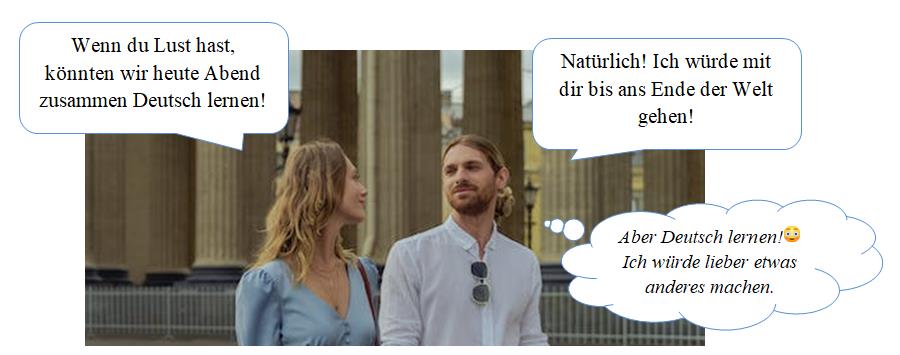In this lesson, you will learn everything about German conditional sentences. We will discuss subjunctive II because in German, in both spoken and written language, it is used to indicate unreal or hypothetical conditions. You will find out how and when they are used, as well as how they are translated into English.
Thank you for reading this post, don't forget to subscribe!CONTENTS
What are Conditional Sentences?
Wenn-clauses
Clauses without wenn
Present time
Past time
What are Conditional Sentences?
Typical conditional sentences consist of a subordinate clause introduced by the conjunction “wenn,” which corresponds to the English “if” and expresses a condition. The main clause expresses the consequence.
For example:
Wenn du Pilze und Käse kaufst, mache ich uns eine Pizza. – If you buy mushrooms and cheese, I’ll make us a pizza.
Wenn ich genug Zeit hätte, käme ich gern ins Kino mit! – If I had enough time, I’d love to go to the cinema with you!
In real conditional sentences, we use the indicative to express a real possibility of the condition being met.
On the other hand, in unreal conditional sentences, we use the subjunctive II to convey a situation where there is no real possibility of the condition being met.
Understanding these distinctions is crucial for effective communication.
For example:
Real: Wenn er zu Hause ist, kann er die Tür für uns öffnen. (indicative)
Unreal: Wenn er zu Hause wäre, könnte er die Tür für uns öffnen. ( subjunctive II)

Wenn clauses
In German, the subjunctive II is used in both the wenn-clause and the main clause, setting it apart from English grammar.
While English typically uses the past tense in “if” sentences and “would” in the main sentence.
However, in German, the past subjunctive or the conditional can be employed in any sentence, depending on the verb used. Common verbs usually take the past subjunctive, while less common or weak verbs typically take the conditional.
This flexibility adds depth and nuance to the German language, making it a fascinating and rewarding language to learn.
For example:
Wenn ich mehr Geld hätte, käme ich gern mit. – If I had more mony I would gladly accompany you.
Wenn wir mehr Geld hätten, könnten wir ein neues Haus kaufen. – If we had more money, we could buy a new house.
Wenn er als Designer hoch gelobt würde, hätte er viele neue Agebote erhalten. -If he was highly praised as a designer, he would have received many new bids.
Die Mutter wäre zufrieden, wenn ihr Sohn bessere Noten bekommen würde/bekäme. –The mother would be happy if her son got better grades.
Clauses without wenn
The conjunction wenn can be omitted, in this case the subordinate clause begins with the verb. These sentences always come before the main sentence. They are used less often in spoken language. The main clause can be reinforced with so or dann.
For example:
Hätte ich Zeit, (so/dann) würde ich ihm helfen. –If I had time, I would help him.
Present time
The past subjunctive or conditional form of Subjunctive II is used to express an unreal condition in the present.
For example:
Wenn ich mehr Geld hätte, würde nach Amsterdam fahren. – If I had more money, I would go to Amsterdam.
Wenn sie Zeit hätte, würde sie mitmachen. – If she had time, she would join in.
Wenn ich ein Mann wäre, würde ich Pilot. – If I were a man, I would be a pilot.
Past time
Conditional sentences with the pluperfect subjunctive express a hypothetical possibility in the past. The pluperfect subjunctive is used in both the wenn-clause and the main clause.
For example:
Wenn er da gewesen wäre, hätten wir es ihm schon gesagt. – If he had been there, we would have told him already.
Wenn ich damals genug gespart hätte, hätteich das Auto gekauft.
Hätte ich damals genug gespart, (so/dann) hätte ich das Auto gekauft.
– If I had saved enough back then, I would have bought the car.
Hättest du damals das Haus gekauft, wenn es dir angeboten worden wäre? – Would you have bought the house back then if it had been offered to you?
See more:



